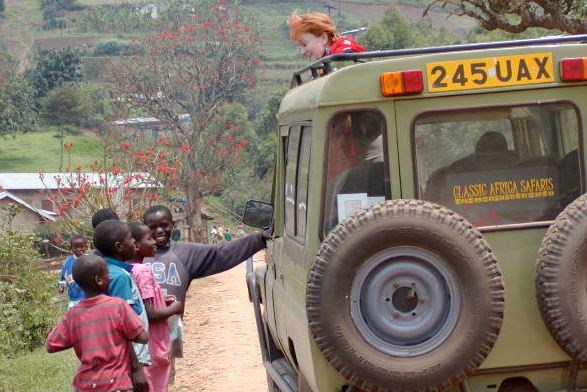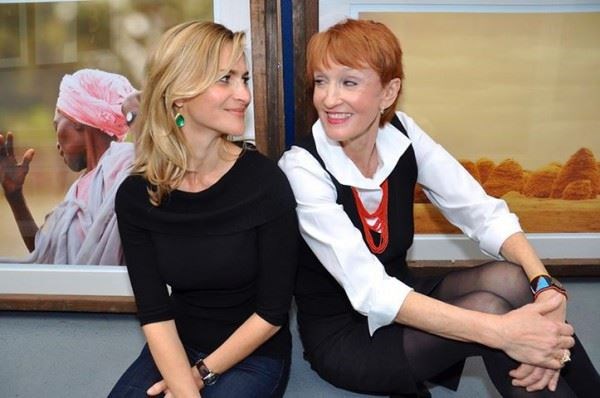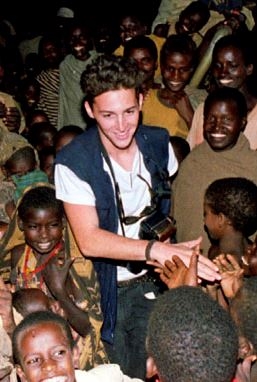Kathy Eldon rushes in, ruffling her fingers fretfully through her signature red hair. She makes her way to the director’s chair, shooing everyone away and laughing: “Get out of here! This is my show!”
Creative Visions Foundation
There’s a peaceful lull over the Creative Visions Foundation, which is perched above an American Apparel along the winding Pacific Coast Highway. The view of the blue ocean waves is occasionally interrupted by a streak of white when a seagull flies by. Kathy created the foundation in 1998 in memory of her son, Dan Eldon. A free (and, according to Kathy, “noisy”) spirit, he put college on hold and went to Africa, becoming compelled to stay working on the frontlines of conflict areas as a photojournalist for Reuters. He was part of a group of journalists who broke the story of the famine in Somalia in 1993. His life was tragically cut short when he was stoned to death in Somalia by a frenzied mob at the age of 22.
The vision for the foundation came to Kathy in a dream one morning. She wrote it down in a journal and tucked it away in a drawer, only to re-discover it two decades later and realize “Slowly but surely, over the course of 23 years, that vision unfolded and manifested into an incredible place that is now supported by so many wonderful people.”
It was in England in 1990, she remembers, in a “very cold room with no curtains.” At the time, her body was wracked with pain and she was jobless. She rushed to write down her vivid dream of “an airy penthouse office that would include an art gallery and center that supported young artists, writers, and cinematographers.”
“I had never had a dream like that before… I started writing down the notes about what I was supposed to do: and I was supposed to create an organization. It had a mission statement: to use the power of media to help people achieve their potential for themselves and the planet. There was a logo: it was the first hexagram of the I-Ching, and it’s the creative force, a really powerful concept. Eventually, I drew a blueprint of the organization I was supposed to create.”
The foundation’s mission is to act as an incubator of the “creative activism” Dan exemplified: “He was a creative activist. He was a photographer, a filmmaker, and an artist, but most of all, he was an activist. He tried to help people.”
“We coined the phrase a couple of years ago to describe people who are using their creativity for good,” Kathy explains. “Everybody has a spark. Some people are dentists. Some people are ice skaters. But, there is a way that you can take that spark and use that part of your life force for good in the world.”
“The first film we supported was Born into Brothels and when that film came out and I saw the name “Creative Visions” on the credits, I realized that we had actually played a role in creating a film that was really bringing to life a subject that nobody had a clue about, which was the children of brothel workers in India. I was so excited and I realized that maybe we could provide more support by not just these tiny, little grants, but by creating a community—an incubator, as it were, around the filmmaker.
Creative Visions Foundation has worked with over 200 projects since 2003:
“It was very lonely out there when we started. Very few people were talking about the role of media and the arts in creating social impact and transformations of societies and consciousness. Now, everybody’s into it.” Currently, they range from a small art exhibit to a major documentary such as Happy, by filmmaker Roko Belic, which investigates what makes people happy. “We have projects on five continents and our films have actually been screened on seven continents, including the Antarctic, which is really exciting,” she says.
Saying she does not necessarily like the word mentor, she says her approach to mentoring is not about telling people what to do: “When I talk to people it’s like my brain clicks into this mode of ‘OK, I’m hearing you and it’s not impossible.’ It’s not a possessive gift, like ‘do this.’ It’s ‘You’re not crazy. Go for it. Please don’t be hampered by what other people tell you or think you should be doing.’”
Although mentoring others is her greatest joy, Kathy was long haunted by her own encouragement of her son to follow his own, unique path, which ended in his murder by the very people he was trying to help. In her memoir, Living in the Heart of Life, she describes her agonizing guilt, wondering if she was responsible for his death by not demanding he stay in college, or stopping him from returning to Somalia as the situation there became more dangerous.
She became free of this painful struggle over time, and it is these lessons she shares. One step along the way to peace was when she finally realized she was also angry at her son, and at the Somalis who took her son from her. But life, or “other forces,” seemed to be at work to help her learn the meaning of what she calls the “F-word,” forgiveness. Ultimately, she came to take the tragedy of her son’s death and use it to make a positive impact, which is the legacy of Creative Visions. Thus the title of her book, based on a quote by by Kahlil Gibran, gains a greater poignancy:
“You would know the secret of death.
But, how shall you find it unless you seek it in the heart of life?”
Living In the Heart of Life
“I loved and hated writing the book,” she says. “It was rejected a million times by different publishers over many, many years, but there was something that I felt that I needed to tell other people, not just women.” However, “after 16 years of trying,” her memoir was published by Harper One.
She escapes from the “endless corn fields” of Cedar Rapids, Iowa, where, she writes, “we weren’t allowed to discuss anything unpleasant in polite company…Nor, for that matter, to argue, swear, or even cry.” We get an idea of what dating was like for a co-ed in the 1960s in her descriptions of college life at Wellesley (“I finally snared a Harvard man”), which she attends at the same time as Hillary Clinton. Then, marriage to Mike Eldon, a handsome Englishman of Romanian-Jewish descent, and a move to London in the swinging 60’s. There, stifled by her role as housewife, she begins binge-eating. But her story really begins when she moves to lush Kenya with her family, which now includes her two children, Dan and Amy.
 |
Like many, she is overwhelmed by the intensity of Africa’s colors, sights and sounds when she arrives. Here, she feels, she’s found her true home. Although frustrated at first at the lack of job opportunities for an expat wife, one night she meets a group of passionate foreign correspondents covering the death of President Kenyetta, during which she writes about an epiphanic moment that speaks of her desire for something more from life:
“Something that had lain dormant since I was a young girl in Iowa, a lifetime away, was starting to awaken. It was impossible to identify it at that moment, nor even guess at its magnitude, but it’s probably true that what happened to me is the story of every woman who has ever gone in search of herself. I was beginning a journey that would transform me utterly, indelibly, horribly — gloriously — taking me places far beyond my wildest imaginings.”
Living in the Heart of Life, reads like a confession, and it’s hard not to admire a spirit striving so relentlessly for self-knowledge, and so courageously for honesty. She does not shy away from talking about eating disorders, or her search for love and ownership of her body, breaking free of the sexual strictures of the 1960s. “It’s a bit spicy,” she admits.
Remarkably, when she realized her children suspected her of having affairs, she tried to talk to them honestly about her mistakes, as well as her needs. Unable to imagine being so brave, I ask, how did she do it? “My parents and I were very close, but I did not talk to them about anything that was potentially embarrassing or substantive in any way. There were so many secrets in our household. And this is the way it was in the ’50s and ’60s. When my children were 12 or 13, a lot of tough things happened in my family that I had a hand in. I learned that keeping secrets was not a solution–they’re really dangerous. So I started to be honest. The relief of that honesty is probably what got us all through.”
 |
She adds, with a dark look, that such honesty is “difficult.” However, her children were honest in return, she says, and the value of such honesty shows in the strong friendship she has to this day with her daughter, Amy Turteltaub (they are next-door neighbors). “My daughter is my closest friend in the world.”
“My son Dan — we were very alike and we would bang heads a lot of the time — but it was honest; it was clear; it was loving; it was truthful; and I shudder to think what the alternative would’ve been.”
“I think that the most important thing for child-rearing is true respect for the child. Within that being is another soul. When you try to listen to them and respect them and assume the very best of them, they tend to give you the very best back.”
***
I ask her about how much she thinks about being a woman. In her pursuit of a life lived to the fullest, she learned about integrating the masculine and feminine sides of herself–the yin and yang of Eastern philosophy:
“It was a very difficult mission to allow the more masculine side of me, the yin side of me, out. I was suppressing my desires and wills in the service of others.” She says this is commonly called being “selfless.”
A turning point came when she found a counselor in Nairobi who changed her sense of the word: “She said the word selfless actually means less of self. Although we think it’s a really admirable thing to do — to be generous and not selfish — to be selfless is not really the goal. It is [instead] the idea of finding that balance within ourselves, so that we can operate without becoming subservient or without becoming dominant.”
I ask her about the safari of the soul, which she describes in the book as “an unexplored continent within each of us waiting to be discovered–a place of joy and sorrow, of darkness and light, with limitless potential, challenging every aspect of our being.”
“I learned in the course of writing the book that we don’t find ourselves, we actually create ourselves. So, going in search of this being is actually a myth.”
“I would prefer for people to abandon the search for who you are. And go on the joyous journey of ‘Hey, this is who I really want to be,’ and being true to that being that we want to so desperately become. We know that person exists somewhere.”
Creative Visions Foundation
In 1992 Kathy started Creative Visions Productions, to produce commercially viable films that were socially aware: “Early on we did a feature with the theme of ivory poaching and it was called Lost in Africa. We have done a number of documentaries, including Dying to Tell the Story, about journalists putting their lives at risk, and Soldiers of Peace, about the children’s peace movement in Columbia.”
“I’m really proud of Global Tribe, which was presented by my daughter Amy when she was 26. It was the first film on grassroots social entrepreneurs. And more recently we have done Extraordinary Moms with Julia Roberts, Hillary Clinton, Rosie O’Donnell and Christiane Amanpour, about the power of mothers to transform the world around them.”
She is excited about a project in the works called Best Care Possible: “It’s about end-of-life care in America. How do we want to die? We want to live fully until the end and then we want to go peacefully.“
Another long-held vision, which exemplifies her advice to “never give up,” is a film about Dan's life. When he was killed, over two decades ago, she says one of her “first coherent thoughts” was she had to make a film about Dan and his young journalist friends, and the people he led on a safari to a refugee camp in South Africa (which included a young Christopher Nolan).
“It’s been a long slog, but we now have the funding in place to be able to make this film.” The film will be directed by a woman, Bronwen Hughes, and the original screenplay was written by Jan Sardi, who wrote the film Shine. “It’s an incredible group of people who are making this film. We couldn’t be more excited.”
“You just have to keep going and believing that there is more for you to do, more to see, more to feel, more to love, more to become than you could ever imagine in this world. Don’t give up, ever.”
***
Update: Two years after this interview took place, Kathy's vision of bringing Dan's story to life in a film was realized: The Journey is the Destination premiered at the Toronto International Film Festival in 2016.
Journey is now available on Video on Demand (VOD) platforms (currently Amazon.com, iTunes and Netflix). The MY HERO International Film Festival awarded Creative Visions Foundation the 2017 Media Award for the film, which is part of a global movement that Creative Visions has been seeding since 1997 to encourage storytelling for social change.




